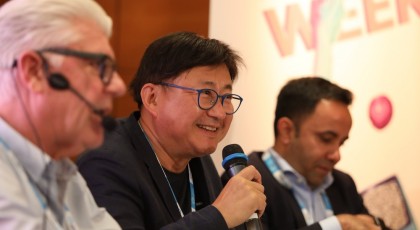
Among the key topics of the media forum second day were content production and it’s features, the integration of local producers into the global market and the ownership rights protection. In order to share the best European practicies within the forum the Delegation of the European Union to Ukraine became one of the organizing partners.
The second day of KMW started with the presentation of global drama trends by the Swiss company The WIT – Analytical partner of KYIV MEDIA WEEK. During the event, supported by TV Channel Ukraine, The WITCEO Virginia Mouseler told the audience about key drama trends of this year — TV series about teenagers and millennials. A first case was dedicated to popular TV series EUPHORIA – an HBO adaptation of Israeli miniseries which, firstly released in 2012. The first season was well-received by critics, and got high ratings, having become the inspiration for other TV series for a younger audience. EUPHORIA is going to be released on global platforms this fall. Another drama trend which shaped the year 2019 is so-called "mothers in lost" stories, about women who get together to support each other and to overcome difficulties. Another great example is the second season of BIG LITTLE LIES by HBO. Restriction of women's freedom and struggle for their rights are also among the hot topics. Of no less popularity are "drama + intellectual property" – a TV show series, based on books.
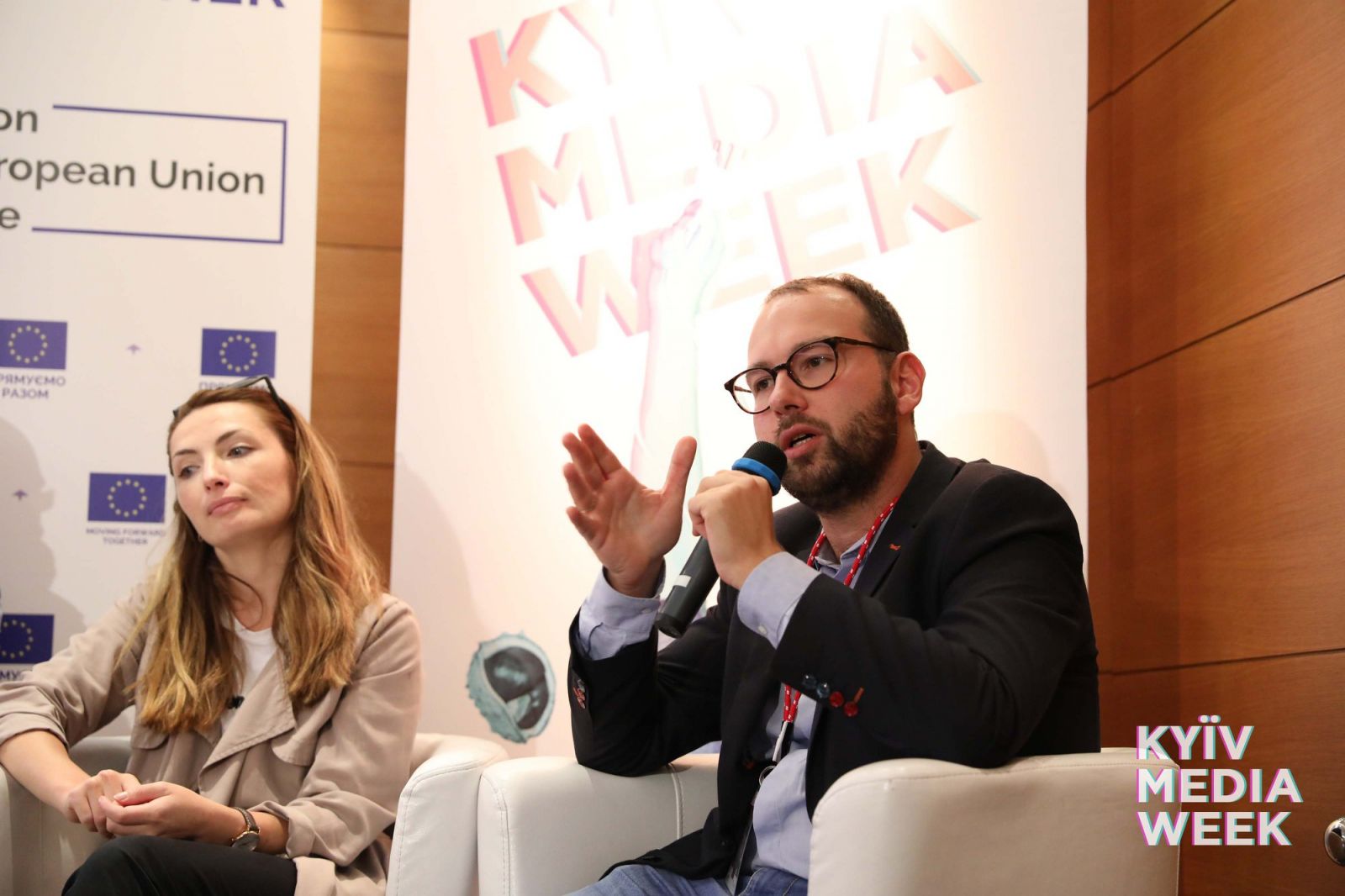 The panel discussion on "CEE drama hits. Unveiling success recipes" organized with the support of CEETVcontinued to elaboration on this topic. Speakers presented the freshest novelties from different countries of the region and discussed the main trends of the past few years. In particular, Mirela Nastase, Director at ZDFE.Drama, noted that it is increasingly common for East European serial projects to appear in large international content markets as they become more and more visible due to their presence on the large streaming services. Emanuele Galloni, CEO of Videoplugger, emphasized that the main trend in TV serial production of Eastern Europe is production budgets increasing. Accordingly, the art of management reaches a new level and the stories approach to the international standards of storytelling. Leonid Godik, International Sales and Acquisition Manager at Beta Film (Germany) agreed with the speaker and noted that the main task in the context of growing budgets is to improve storytelling to the level of technical capabilities of production.
The panel discussion on "CEE drama hits. Unveiling success recipes" organized with the support of CEETVcontinued to elaboration on this topic. Speakers presented the freshest novelties from different countries of the region and discussed the main trends of the past few years. In particular, Mirela Nastase, Director at ZDFE.Drama, noted that it is increasingly common for East European serial projects to appear in large international content markets as they become more and more visible due to their presence on the large streaming services. Emanuele Galloni, CEO of Videoplugger, emphasized that the main trend in TV serial production of Eastern Europe is production budgets increasing. Accordingly, the art of management reaches a new level and the stories approach to the international standards of storytelling. Leonid Godik, International Sales and Acquisition Manager at Beta Film (Germany) agreed with the speaker and noted that the main task in the context of growing budgets is to improve storytelling to the level of technical capabilities of production.
"Cooperation with Asia: co-production, adaptation, distribution,'' – panel discussion where speakers presented new successful content formats of these three countries: China, India and South Korea. The Founder of iFormats, a Producer at Shanghai Media Group, Vincent Sun, noted that effective cooperation with China requires, first of all, the understanding of its cultural peculiarities, which allows finding common ground with the country representatives. Examples of successful co-production with China include not only feature films but also documentaries made in coproduction with the USA. Manjyot Sandhu, Regional Head Europe at Zee Entertainment, told about the situation in India. According to him, now India, like the rest of the world, is becoming an active user of OTT services, with about 80 million subscribers for the biggest platforms. Content produced by the country today goes far beyond Bollywood aesthetics. Besides, Indian buyers show a great interest in foreign formats; drama series are of the particular interest for co-production. As for South Korea, Kenny Bae, Senior Producer and marketing manager at KBS, noted that despite the country's leading position on the Asian content market for foreign television channels, producers and distributors are very interested in co-production projects. According to the speaker, among the potentially interesting topics are history movies, unfolding the theme of world wars.
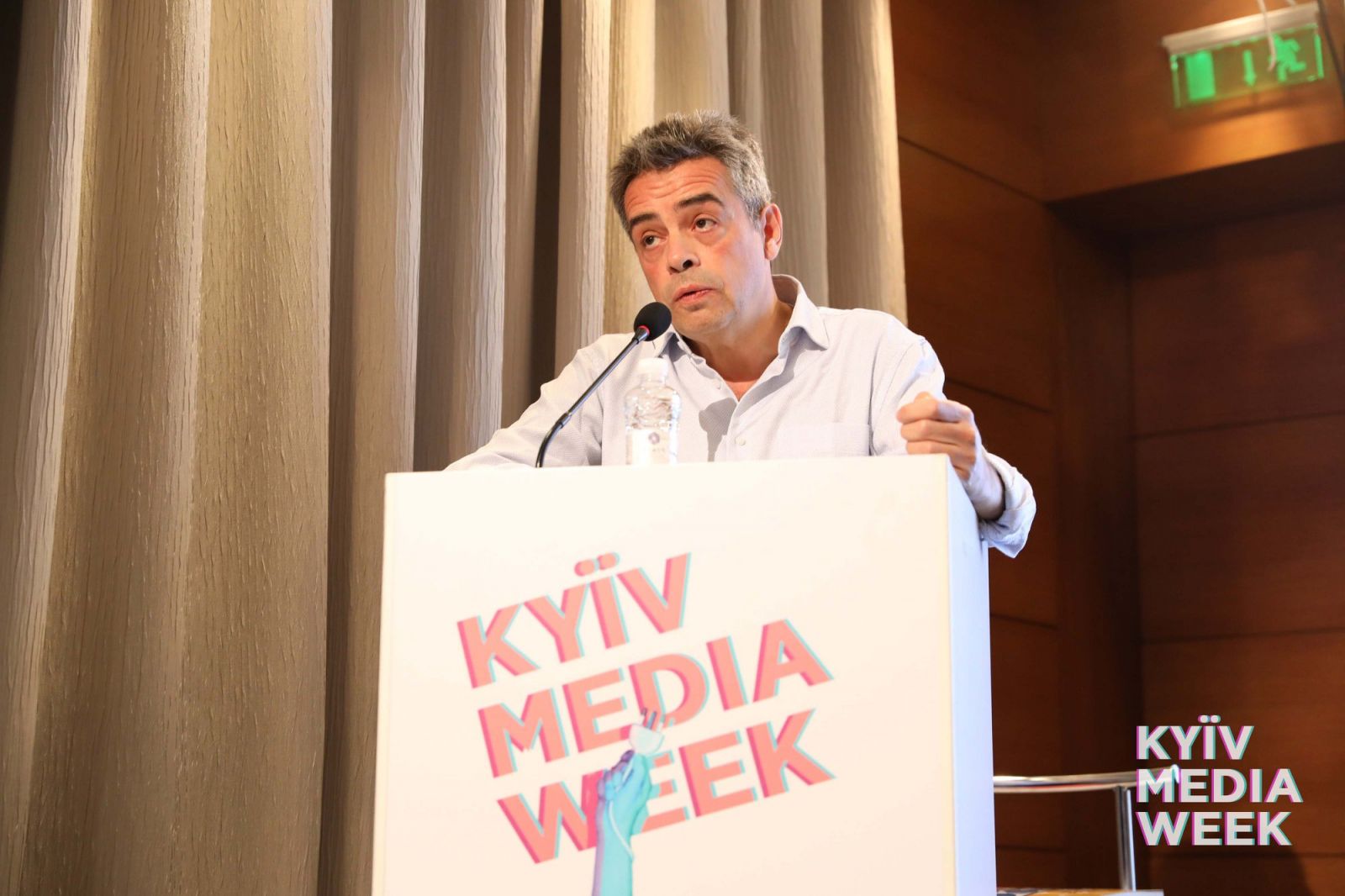 The event "Film promotion abroad. UNIFRANCE experience", supported by Ukrainian State Film Agency, was dedicated to the interaction between local and global. Why is it so important for a country to export its films? For 70 years, UniFrance specialists have been promoting French cinema in the world. How they do it, where do they find funds, how do they spend the budgets and how they make the world aware of the French cinema? Joël Chapron, UNIFRANCE Central and Eastern European manager for the promotion of French cinema abroad answered all of these questions.
The event "Film promotion abroad. UNIFRANCE experience", supported by Ukrainian State Film Agency, was dedicated to the interaction between local and global. Why is it so important for a country to export its films? For 70 years, UniFrance specialists have been promoting French cinema in the world. How they do it, where do they find funds, how do they spend the budgets and how they make the world aware of the French cinema? Joël Chapron, UNIFRANCE Central and Eastern European manager for the promotion of French cinema abroad answered all of these questions.
One of the key events for KMW second day was presentation of a new MBR report called "Media Business Reports: analytical report on film and TV industry of Ukraine – key facts and trends of the year." During the event a presentation of new information and analytical platform about media business and AV content industry – Media Business Reports (MBR)took place. The new platform and comprehensive report on key indicators and trends in the field of Ukrainian cinema and TV were prepared and presented by MBR analysts Editor-in-Chief Anastasia Rakhmanina and Deputy Editor-in-Chief of MBR, Head of Analytical Department of Media Resources Management and MBR, Artem Vakalyuk. In particular, Anastasia focused on the changes of a number of cinema halls in Ukraine, what is the current situation in comparison to the similar indicators in European countries and also highlighted the issue of the lack of cinema halls in small towns with a population 200-300 thousand people. Artem shared the information about financial performance of Ukrainian film distribution, state support for Ukrainian film and television production, analyzed the Ukrainian TV content of recent years and key indicators of TV ads. Thus, the speakers have contributed to the KMW audience’s better understanding of all key processes on Ukrainian media industry landscape, as well as identified the main trends that will shape future development of AV market. The nwe platform aims to create the comprehensive vision of Ukrainian AV market and its place on the global arena. "MBR is only about the news that matter," Rakhmanina emphasized.
This year the KMW program is full of events dedicated to high technologies. For example, the presentation "Beyond Screens, about VR/AR, design and UX", backed by The Creatives' Catalysts. The speaker was Alysha Naples, Chief Experience Officer at Tin Drum, Immersive Experience Designer. She told that the innovations sometimes might do more harm than good. As the algorithms, which were designed only to supplement something, could eventually come to the forefront, AR and VR should be more safe and controlled. Speaker urged the audience to always ask two important questions while thinking about innovations: why to create something new and what are the possible consequences?
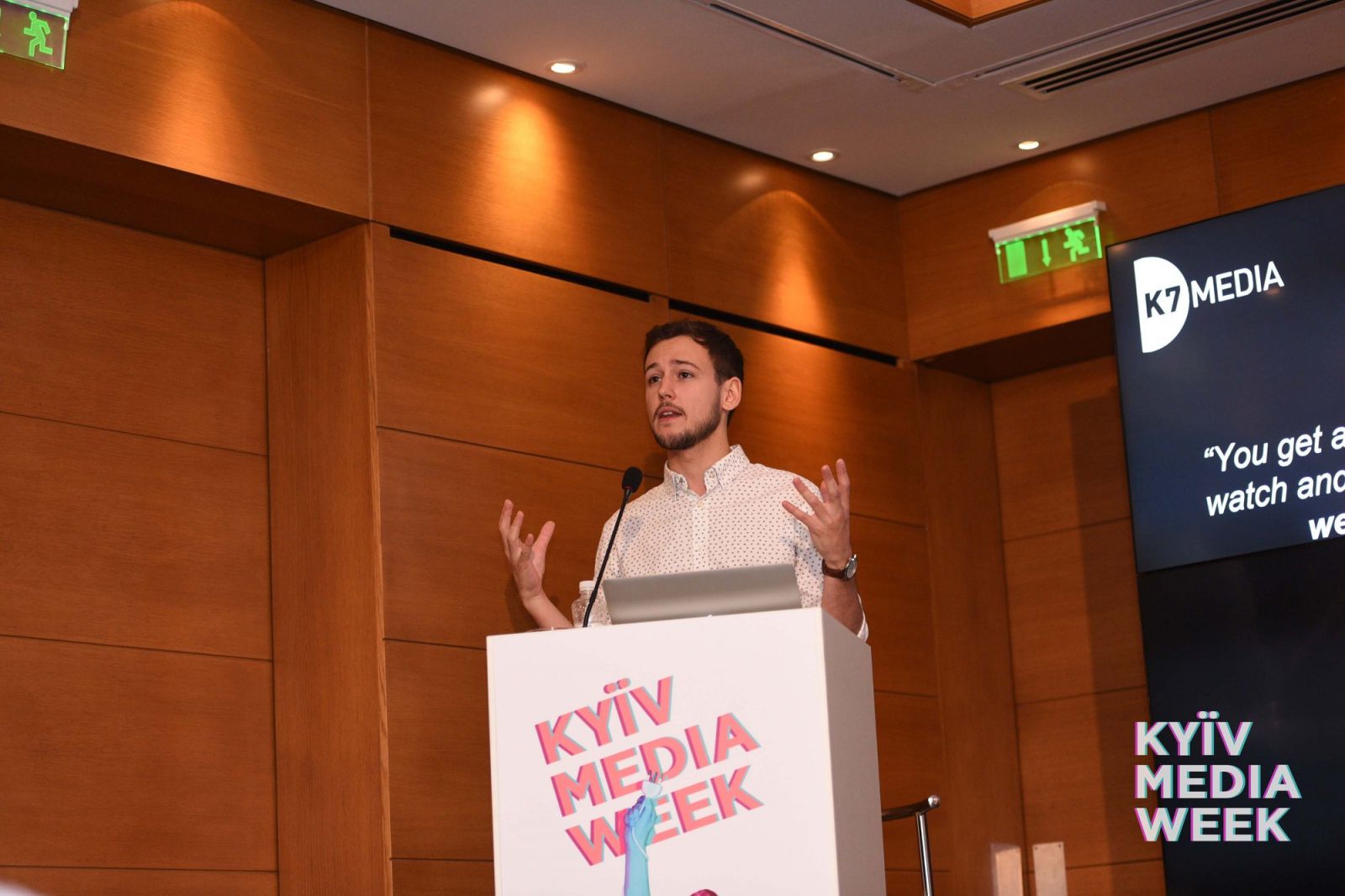 David Ciaramella, Communications Manager at K7 Media, KYIV MEDIA WEEK's Knowledge Partner, also focused on high technologies. He presented the event "On-demand evolution: Where next for the streamers?", where he talked about SVoD market evolution, new players and trends in a field of local production. By 2025, four SVoD services - Netflix, Amazon Prime, Apple TV + and Disney + are predicted to have almost 441 million subscribers. Today, SVoDs are no longer operate only as distribution platforms, now they are full-fledged content creators: for example, last year Netflix spent about $ 14 billion on content, and 85% of this amount on the original production.
David Ciaramella, Communications Manager at K7 Media, KYIV MEDIA WEEK's Knowledge Partner, also focused on high technologies. He presented the event "On-demand evolution: Where next for the streamers?", where he talked about SVoD market evolution, new players and trends in a field of local production. By 2025, four SVoD services - Netflix, Amazon Prime, Apple TV + and Disney + are predicted to have almost 441 million subscribers. Today, SVoDs are no longer operate only as distribution platforms, now they are full-fledged content creators: for example, last year Netflix spent about $ 14 billion on content, and 85% of this amount on the original production.
Guy Bisson, Executive Director at Ampere Analysis, told KMW audience about streaming services in a presentation called "Successful streaming content strategies: Lessons from the CIS and beyond". According to Guy Bisson, streaming services have significantly increased the local content production volume in their countries: both purchased and original. Unfortunately, Ukraine does not have considerable achievements in this field yet, major international streaming services do produce the original content here because of the low subscriber base in our country. However, there are some examples of Ukrainian-made content purchased by streaming services. According to Guy Bisson, the largest SVOD content buyers from our region (including Belarus, Kazakhstan, Moldova, Azerbaijan, Georgia, Kyrgyzstan, and Uzbekistan except for the Ukraine) is Amazon Prime Video, followed by Netflix, the Chinese Youku and Tencent Video.
Content production and distribution were discussed during traditional KMW conference "Fighting Piracy in Ukraine: 5 "what for" and results of the fight against content theft", organized by the ”Clear Sky Initiative”Public Union. The fight against piracy in Ukraine is not only a necessity, but it is also a business. This conclusion was made by media groups after years of fruitful cooperation with the Clear Sky Initiative. According to one of the speakers, Alexey Shuldeshov, General Producer of TV channels, Star Media, over the entire period of fighting against piracy, it was estimated that his group placed 300 million advertising inventories, that is 300 million contacts through built-in players including the piracy sites. "Colleagues should only imagine how much money is it, if we speak about the advertising market," he concluded. "Clear Sky" results and other anti-piracy practices bring many benefits: according to statistics, 80 to 93% of piracy links has been removed, which is even more effective than searches and lawsuits. Besides, the results of Gemius study were announced in the framework of the conference. According to them, more and more residents of Ukraine are ready to pay for the video content. But, unfortunately, the average Ukrainian audience has not yet fully realized that for the creation of any content efforts and money are to be invested, thus this requires compensation. Nevertheless, slowly but surely, Ukraine is moving in the right direction.
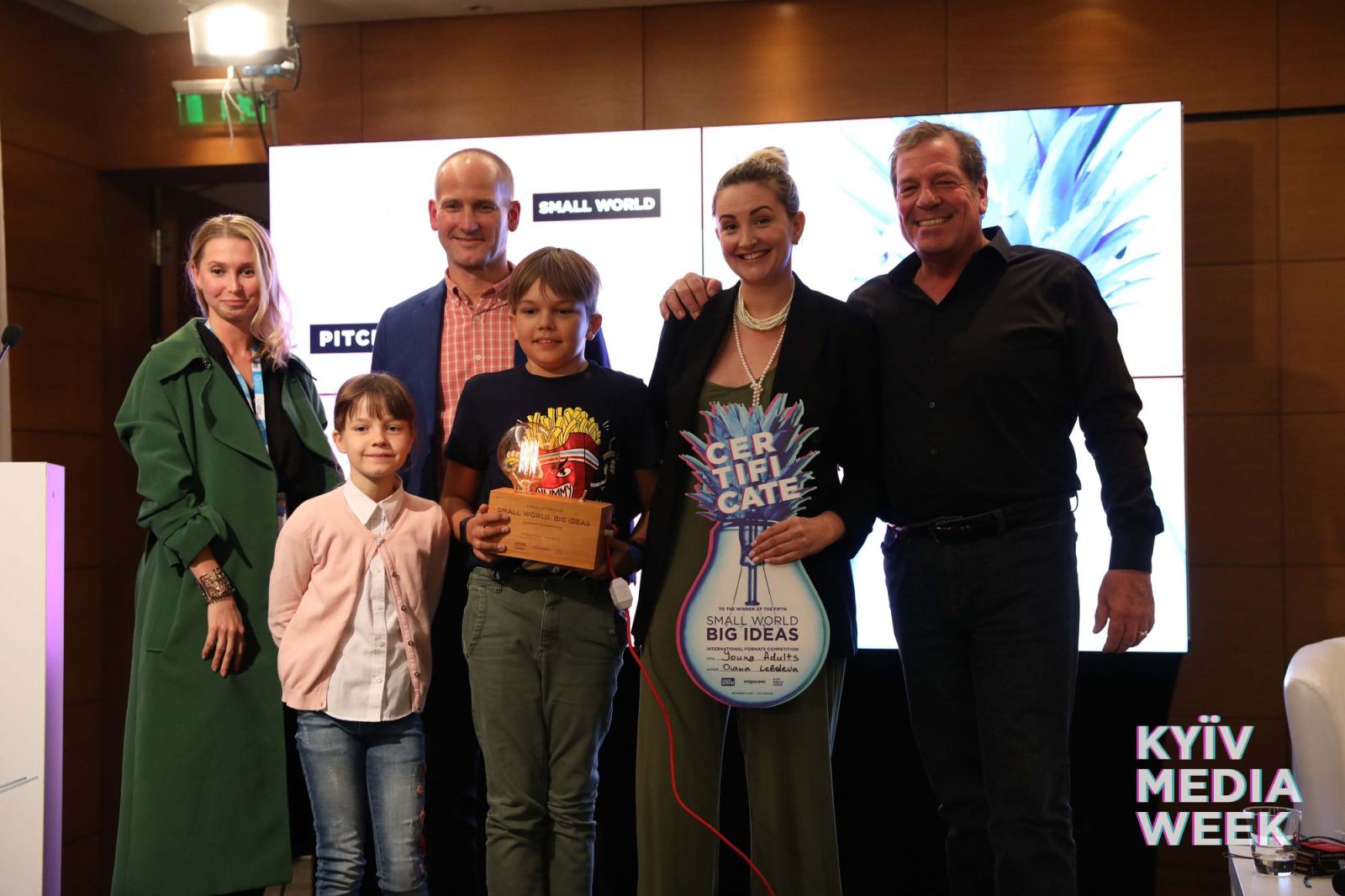 On the second day of KYIV MEDIA WEEK, the final of international competition of non-scripted entertainment formats SMALL WORLD. BIG IDEAS 2019 took place. The event was organized with the support of Ukrainian company Media Resources Management in partnership with Small World IFT (USA) and MIPCOM (France).
On the second day of KYIV MEDIA WEEK, the final of international competition of non-scripted entertainment formats SMALL WORLD. BIG IDEAS 2019 took place. The event was organized with the support of Ukrainian company Media Resources Management in partnership with Small World IFT (USA) and MIPCOM (France).
The authors of the five projects made it to the final and presented their ideas to the jury, which included Creative Producer of the entertainment department at 1+1 TV channel, Ksenia Chorna, Editor-in-Chief at C21, Ed Waller and Tim Crescenti, President of Small World IFT.
List of participants:
Irina Sargan (Ukraine) – project "Battle Of Followers"
Elena Tarashchanskaya (Finland) – project "Tower Of Babylon"
Andrey Sukach (Ukraine) – project "I’M LUCKY TODAY"
Victoria Burdukova, Anna Zhyzha (Ukraine) – project "Homesick"
Diana Lebedeva (Ukraine) – project "Young Adults"
The latter participant became the winner of this year's competition. However, it doesn't mean that the jury didn't like the rest of the projects: according to Tim Crescenti, competition rules and project formats, Small World IFT work with created limitations for judges. “We are a niche distributor, so we choose projects that fit our style. We like formats which allow its audience to learn more about themselves,” he added.
Project "Young Adults" by Diana Lebedeva tells about teenagers who are trying to show their parents that they are adults and can make decisions on their own. For one week five participants immerse in truly adult life: they go to work, look after the children from the kindergarten, take care of the neighbor’s dog, etc. When teenagers run out of their budget ($ 500) they won’t be able to call their parents and ask for help.
We remind you that the winner of SMALL WORLD. BIG IDEAS 2019 will receive an opportunity to enter the global market for audiovisual content — MIP TV, which will be held next year in Cannes. Moreover, Small World IFT will become the exclusive distributor of the format on the international market.
For the first time ever the Delegation of the European Union to Ukraine became the oficcial partner of the forum. Behind this decision are steakholders' trust, forum reputation and tendency to sharing the best European practicies in Ukraine.